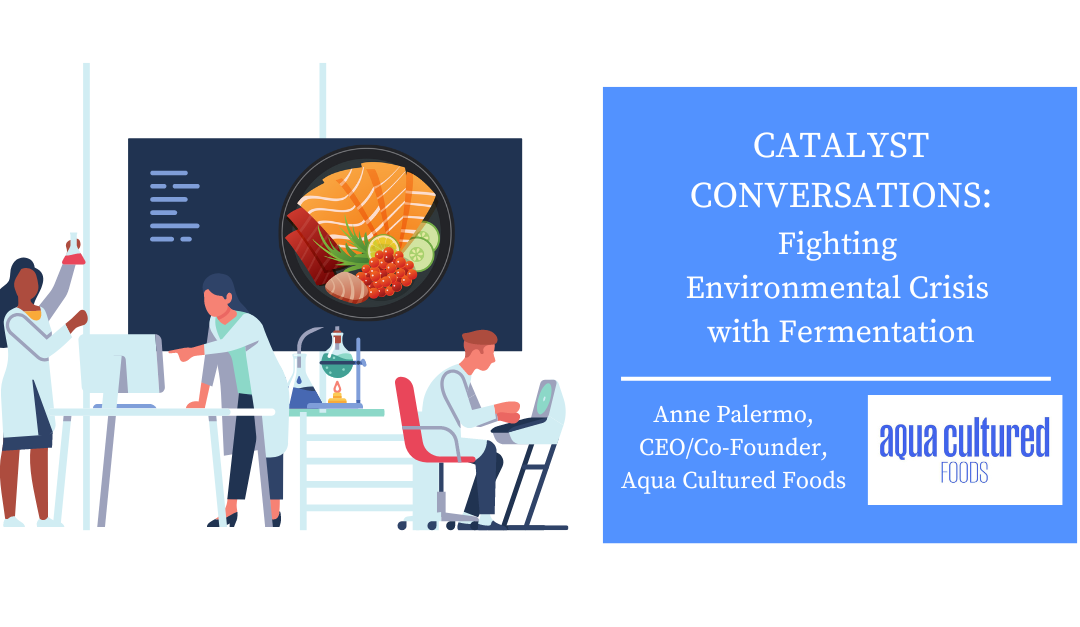CATALYST CONVERSATIONS: Fighting Our Environmental Crisis with Fermentation
According to Boston Consulting Group, dollar for dollar, investing in protein and dairy alternatives does far more to reduce greenhouse gas emissions and stave off climate change, than green buildings or zero-emission cars. Increasing the global market share of alternative proteins from 2% today to 8% by 2030 could yield an emissions reduction equivalent to decarbonizing 95% of the aviation industry.
Anne Palermo is the CEO and co-founder of Aqua Cultured Foods, a leading future food startup and Venture Engine alum in the alt-protein space. After closing the largest pre-seed round in alt-seafood, Anne is focused on using Aqua’s novel fermentation technology to bring to market nutritionally superior, hyper-realistic, whole cuts of seafood alternatives. Anne began her career in finance before transitioning into food tech, food science and culinary innovation with the launch of her first CPG company. While there, she developed proprietary technology pertaining to manufacturing processes and the product formulations used in a high-protein snacking platform. She quickly scaled the company to a multimillion-dollar run rate.

Anne Palermo, CEO/Co-Founder, Aqua Cultured Foods
What inspired you to get into alt seafood innovation?
Seafood has the most insecure supply chain of all animal proteins. Due to overfishing and climate change, we’re seeing global loss of marine life. It’s gotten so bad, that 90% of all wild fisheries are categorized as overfished, leaving 170 countries with unmet demand for seafood.
Fermentation derived proteins. Can you share with us the benefits of this incredible process and the impact it will have on sustainability in the food space?
Fermentation derived ingredients give our global community the opportunity to create large quantities of proteins, fibers and micronutrients in a minimal manufacturing space. At scale, these vital nutrients will be available at a cost below that of what we currently achieve through traditional methods of food production – partly due to the minimal downstream processing required to turn the ingredients into a delicious, craveable product and partly due to the inexpensive inputs needed to drive the growth of the product itself.
“ The entire planet’s future, and humanity, may depend on aggressively funding and marketing alternative proteins. It may be the only way to stave off environmental collapse and feed people sustainably.”
Food technology is evolving at a rapid pace. Can you talk to us about the role that R&D plays in the food tech space?
R&D is the catalyst towards the creation of an end product that so closely imitates the taste and texture of a product that it can fool even the most staunch meat-eating consumer. Continued technological advancement is required to not only perfect the overall eating experience, but also to drive costs down and make these products more readily available to the end consumer
There is a lot of conversation around the decline of VC funding. ACF just landed a 5.5 million seed round. Can you share some of the challenges and some of the resources that helped you push through the noise?
By focusing on execution of our well thought out strategy and spending in the areas where we could see the highest ROI, we’ve been able to achieve milestones ahead of schedule. As a company, we are continuing the R&D of our products to repeatedly improve and expand on product offerings. However, we also need to ensure that we maintain a focus on our company’s path to profitability. In a tight macroeconomic environment such as the one we are currently in, companies need to focus on growth without compromising on future returns.
You’ve recently announced that ACF is opening a production facility in Chicago’s west loop. Can you tell us a little about why you choose Chicago/Illinois for your first brick and mortar?
Chicago is home to many of the largest food companies in the world. It only makes sense for us to focus our growth here as it is provides resources and connections to many of the most brilliant minds in the industry. Plus, Chicago has (arguably) the best food scene in the country.

